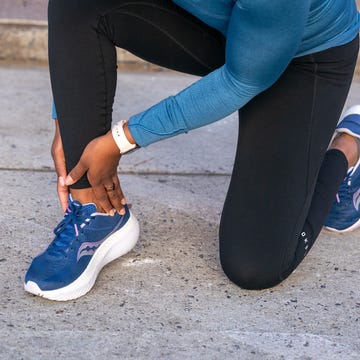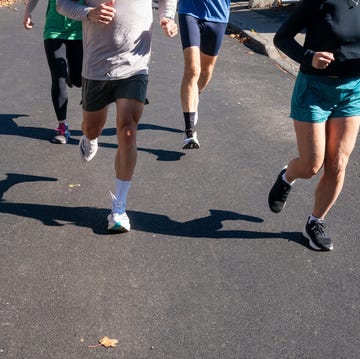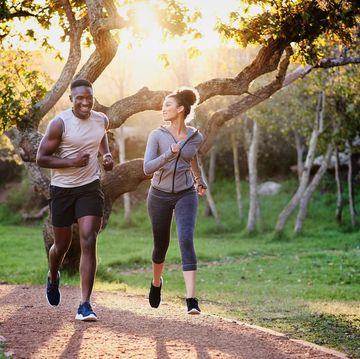There’s never a “good time” to get your period. But on race day? That’s just mean.
New York City Marathon New York City Marathon, three-time champion Mary Keitany, 35, from Kenya, failed to make it a four-peat, coming in second to American Shalane Flanagan. Running in the Cold’Nutrition - Weight Loss LetsRun that she got her period for the first time in three months the day before the race, with left her with less energy.
Hitting peak performance is hard enough without having killer cramps to contend with. But, here’s the head-scratching catch: Paula Radcliffe first broke the world record in Chicago in 2002 after suffering period cramps throughout the last third of the race. In fact, many women score personal bests when running during their period, says Julie M. Levitt, M.D., a 14-time marathoner and board-certified OB/GYN with the Women's Group of Northwestern in Chicago, Illinois.
Yep, running with your period comes with more than cons. But, remember, periods aren’t as simple as being “on” or “off” of them. Your levels of two key female hormones, estrogen and progesterone, fluctuate all month long. (Hence why it’s called your monthly cycle.) Those two hormones influence not only your womanly parts, but also your body’s ability to convert food into energy, fuel your muscles with oxygen, and keep your body from dehydrating, overheating, and tuckering out.
That means your hormones affect your performance all month long—just in different ways, says Marta Montenegro, M.S., C.S.C.S., a nutrition specialist, exercise physiologist, and lifestyles consultant at IVFMD, South Florida Institute for Reproductive Medicine.
Learn how your running performance ebbs and flows with your monthly cycle:
How Run/Walk Intervals Can Improve Back Pain
During your period—whether it comes on its own or by taking your birth control placebo pills—your body’s levels of estrogen and progesterone are at their lowest, making you more neutral/androgynous/manly, biologically speaking, Levitt says. Your body knows it’s not getting pregnant, so its systems aren’t focused on making your uterus into an incubator. Your body can do things other than make babies—including run. Your body’s better able to convert carbs into energy, keep you from overheating, and help you recover, Montenegro says.
But during the hours immediately before and after your period starts, your uterus is busy churning out prostaglandins, compounds that make your uterine muscles contract (cramp) and force out your endometrial lining, Levitt says. Whatever your hormonal advantage, it’s hard to just power through all of that.
So, if you just happen to wake up race day with cramps, Levitt recommends using a heating pad or light warmup. By increasing your core temperature, both will speed up your body’s breakdown of these inflammatory compounds, she says. A warmup will also increase your circulation and production of pain-killing endorphins to help ease your pain. While NSAIDs may help, they can cause stomach troubles, so it’s important to know how they affect you before loading up on race day, she says.
What’s more, when you lose blood during your period, you are, in effect, losing fluids, iron, and hemoglobin. Your body’s ability to transport oxygen and other nutrients to your working muscles is reduced, and you risk dehydration, says Montenegro, who recommends hydrating and eating more iron-rich foods if you’re expecting to race during your period.
Why High Hormones Mean Slower Times
During the follicular phase—from the day you say, “Yes, my period is over!” until you ovulate (for women with “regular” cycles, this is sometime between day seven and 22)—your estrogen levels are on the rise.
That shift causes your metabolism to use fat, rather than carbohydrates, as its primary energy source, Montenegro says. That makes your pre-race carbo-loading of little benefit. While fats can help fuel low-intensity endurance exercise, without the ability to efficiently convert carbs and glycogen into fast-acting energy, you may feel sluggish and will have trouble kicking it at the end of a race.
Also, because your body stores three grams of water with every gram of stored carbs—and you aren’t burning those—you begin to retain water during this phase, she says.
Then, when you ovulate, your body switches into “let’s get pregnant” mode (the luteal phase) and stays there pretty much until your period hits. During this time, your progesterone levels also begin rising, until it and estrogen hit their peaks. Apart from making you bloated, constipated, emotional, and generally PMS-y—especially in the days just before your period—they make you about as inefficient of a runner as you can be.
The spike in hormones increases your body’s tendency to break down protein—that’s right, muscle—for energy. Meanwhile, your sodium and blood pressure levels rise.
Your kidneys redistribute all of that water hanging out in your muscles, making you feel bloated. And, your sweat response becomes delayed, making it easier to become overheated during your race. “It becomes harder to work at the same intensity,” Montenegro says. “Everything is working against you.”
So, basically, your period’s not all that bad.














